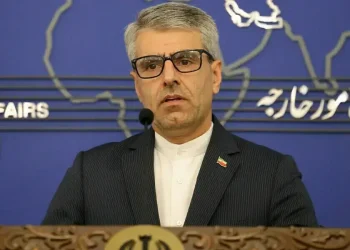PARIS (news agencies) — The Syrian soldiers came first, at night, for the son, Patrick, a 20-year-old psychology student at Damascus University, and said they were taking him away for questioning.
They came back the next night for his father, Mazen.
Five years later, in 2018, death certificates from Syrian authorities confirmed to the Dabbagh family that the French-Syrian father and son would never come home again.
In a landmark trial, a Paris court will this week seek to determine whether Syrian intelligence officials — the most senior to go on trial in a European court over crimes allegedly committed during the country’s civil war — were responsible for their disappearance and deaths.
The four-day hearings from Tuesday are expected to air chilling allegations that President Bashar Assad’s government has widely used torture and arbitrary detentions to keep power during the conflict, now in its 14th year.
The French trial comes as Assad has been regaining an aura of international respectability, starting to shed his long-time status as a pariah that flowed from the violence unleashed on his opponents. Human rights groups that are parties to the French case hope it will refocus attention on alleged atrocities.
Here’s a look at those involved:
Ali Mamlouk, former head of the National Security Bureau overseeing Syrian security and intelligence services. Allegedly worked directly with Assad. Now in his late 70s.
Jamil Hassan, former Air Force intelligence director. Survivors testifying in the case allege having seen him at a detention center in the capital, Damascus, where the Dabbaghs are thought to have been held. In his early 70s.
Salam Mahmoud, in his mid-60s, a former investigations official at a Damascus military airport believed to house the detention center. Mahmoud is alleged to have expropriated the Dabbaghs’ house after they were taken away.
The three men are accused of provoking crimes against humanity, giving instructions to commit them and allowing subordinates to commit them through the alleged arrest, torture and killing of the father and son. They also are accused of confiscating their house and of putting Air Force intelligence services at the disposal of people who allegedly killed them.
The accused are being tried in absentia. French magistrates issued arrest warrants for them in October 2018, despite acknowledging that there was little likelihood of their extradition to France. Defense lawyers will not represent them and French magistrates determined they don’t have diplomatic immunity.
“The three people accused are very senior officials of the Syrian system of repression and torture. This gives a particular tone to this trial. They are not small fish,” said Patrick Baudouin, a lawyer for rights groups involved in the case.
“The legal file is very detailed, full of evidence of systematic, very diverse and absolutely monstrous torture practices,” Baudouin said.
Patrick and Mazen Dabbagh had dual French-Syrian nationality, which enabled French magistrates to pursue the case. The probe of their disappearance started in 2015 when Obeida Dabbagh, Mazen’s brother, testified to investigators already examining war crimes in Syria.
Obeida Dabbagh lives in France with his wife, Hanane, and is also a party in the case. According to the trial indictment, seen by media, he told French investigators that three or four soldiers came for Patrick around 11 p.m. on Nov. 3, 2013, during the height of Arab Spring-inspired anti-government protests that were met by a brutal crackdown. The soldiers identified themselves as members of a Syrian Air Force intelligence branch. Obeida also testified they searched the house, taking cellphones, computers and money.
They came back the next night for Mazen Dabbagh, who was 54 and worked as a counselor at a French high school in Damascus, and also took his new car, the brother said.
Their death certificates said Patrick died Jan. 21, 2014, and Mazen on Nov. 25, 2017, but didn’t say how or where.
French investigating magistrates collected evidence from Syrian regime deserters and prison survivors as they built the case.
Testifying anonymously, survivors’ accounts speak in the indictment of rape and of being denied food and water, of beatings on feet, knees and elsewhere with whips, cables and truncheons, of electric shocks and burnings with acid or boiling water, of being suspended from the ceiling for hours or days.










 American Dollar Exchange Rate
American Dollar Exchange Rate